From frivolous stories to pornoglans: the history of erotic magazines
Currently, no one will be surprised by erotic photos in swimsuits. On the Internet, you can easily find much more explicit content. But it wasn't always like that. Previously, in order to get images of a sexual nature, people took very risky actions. What were the very first adult magazines, how they became popular all over the world and why some of them continue to print huge circulations to this day.
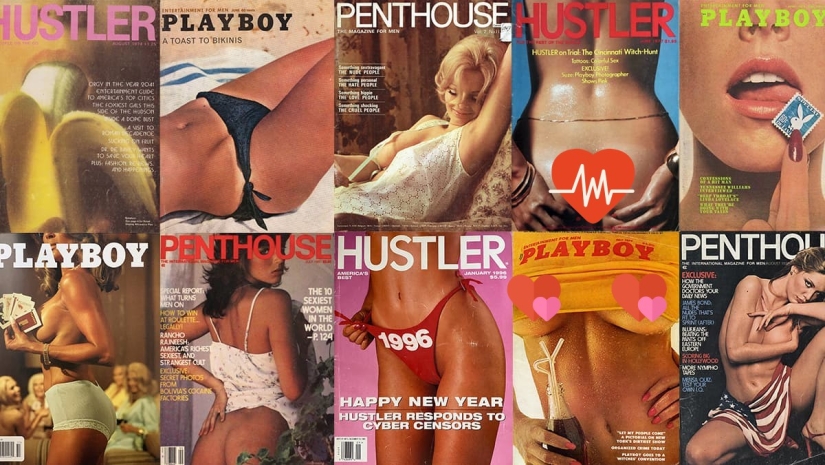
It seems that eroticism began to exist at the very time when the first man appeared on Earth. But it has only recently begun to acquire at least some visual form for society. If we do not take into account all the found ancient rock paintings of pornographic content, then the world's first erotic magazine "Pearl" / "The Pearl" began publishing in July 1879.
His publisher, the Englishman William Lazenby, published frank stories of fetishists of that time in The Pearl. "Pearl" excited the imagination with its frank texts. A total of 18 issues were published, after which in December 1880 the British authorities closed The Pearl for violating modern moral and ethical standards.
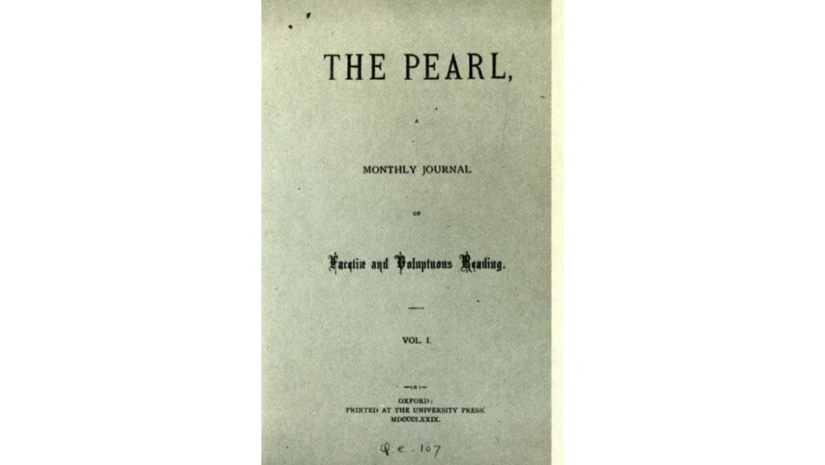
It is worth noting that the underground edition was limited to only 150 copies of each issue. They could be purchased for crazy money at that time – 25 British pounds.
With the advent of halftone printing, consumers began to enjoy not only the voluptuous texts of "Pearl", but also candid images of flirtatious girls. It was the cheap printing of black-and-white photographs that allowed adult magazines to be mass-consumed.
The very first to produce pornographic pictures were the French. They printed photos of half-naked burlesque performers. In order to somehow smooth out the growing indignation of the conservative part of society, adult magazines began to skillfully disguise themselves as art publications supposedly dedicated to naturism.
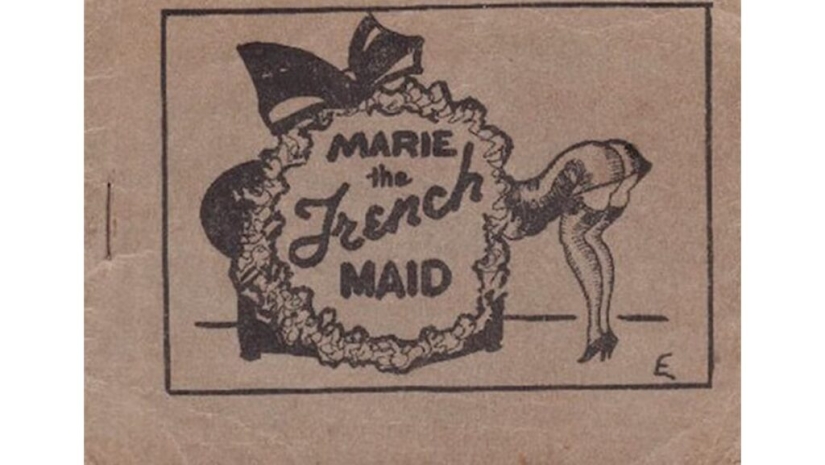
In the 1920s, the first pornographic comics or the so-called "Tijuana Bibles" appeared in America. They had only 8 pages with caricature pictures, and the size easily fit in the palm of your hand. Intimate mini-stories were often based on urban legends, tales about sex or vulgar jokes. Anonymous authors were not ashamed to use famous actors, athletes and even members of the royal family as characters.
The very name of the "Tijuana Bible" appeared because of the deep conviction of readers that pornographic comics are printed somewhere in the Mexican town of Tijuana, and then smuggled into the United States.
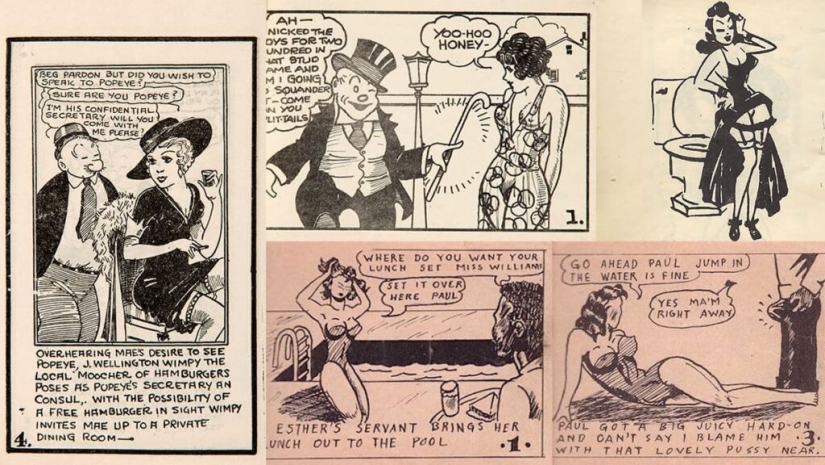
Pornographic comics were sold from under the counter for only $ 0.25 in places with the largest concentration of male audience. Most often, you could buy the "Tijuana Bible" in bars, garages, hairdressers, bowling alleys and burlesque shows.
In the 1930s, during the Great Depression, about a million 8-page pornographic comics were sold. After that, the popularity of the "Tijuana Bibles" began to decline.
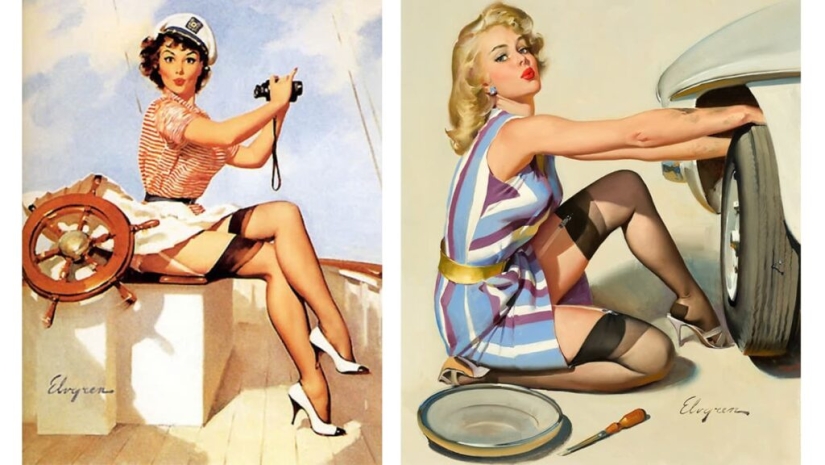
In the 40s, the attention of society was attracted by the dream girl – Pin-up Girl. Translated from English, "pin-up" means "pinning". Soldiers during the Second World War often tore out images of beautiful naked girls from men's magazines and calendars and pinned them on the walls of their barracks.
Neat curls, plump lips and an hourglass figure – that was exactly what the dream girl was. The US government often used the image of sexy Pin-up Girls on propaganda posters encouraging young people to join the army.
The most famous Pin-up Girl during the Second World War is Betty Grable. A photo in a bathing suit allowed Betty to surpass even the actress Rita Hayworth in popularity. A little later, the creator of the famous erotic magazine "Playboy" Hugh Hefner will call Betty the source of his inspiration. The first issue of the famous gloss was published in 1953. The cover featured a photo of the rising star Marilyn Monroe.
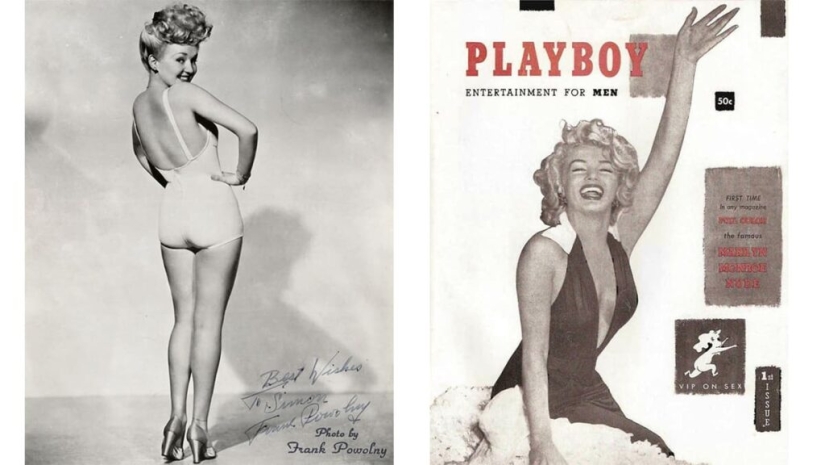
Hefner himself did not believe until recently that Playboy would be published, so the famous rabbit logo with a tuxedo butterfly appeared only in the second issue. To open the magazine, it took only $8000, which Hugh Hefner borrowed from all his friends. But already in the early 80s, the company's annual profit was $11 million.
Initially, "Playboy" was supposed to be called "Stag-Party" – "Bachelor Party". And they wanted to use the image of a deer as a logo. But this idea had to be abandoned because of the already existing at that time magazine "Stag".
The loud name "Playboy" appeared thanks to the workshop of the same name, in which the mother of Hugh Hefner's friend worked. And the logo was the famous rabbit with a butterfly from a tuxedo, which symbolizes the refined male society and the corresponding lifestyle.
But Playboy has gained the greatest popularity thanks to its spreads with naked representatives of the fair sex. The magazine also often used the image of the girl next door, which undoubtedly attracted men of different ages with its simplicity, ease and accessibility.
A little later, the magazine published headings with girls of the month and girls of the year. Increased revenues from the sales of the magazine allowed Hugh Hefner to open the first men's club in Chicago in the 60s. To become a member of the prestigious club, representatives of the male half of humanity had to purchase a special door key for $ 25.
Waitresses in tight-fitting bodysuits, with butterflies on their necks, rabbit ears and a tail became the hallmark of the institution. The image of the Bunny girl was a real sex symbol of America of those years.
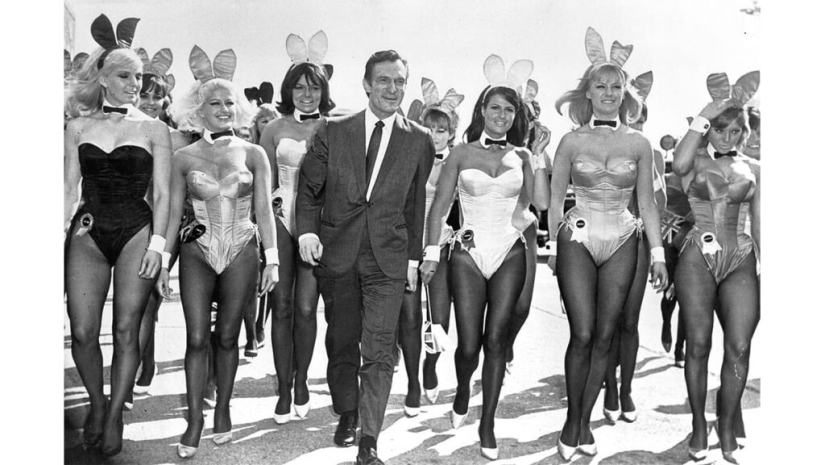
Hefner himself never considered Playboy to be a magazine about sex. In numerous interviews, he always said that this publication is about a lifestyle in which sex occupies one of the main niches. In March 2020, the world saw the last printed issue of Playboy magazine. Now it can be read and viewed only on the Internet.
Another popular erotic gloss was "Penthouse". It was founded by Bob Guccione in 1965 and contained more explicit photos than in Playboy.
Adult magazines "Playboy" and "Penthouse" have always been the main competitors in the market. In the 70s, a real "pubic" war broke out between the glossies. Everyone tried to show a little more cm of the intimate part of the body than his competitor.
As a result, Marilyn Cole became the first model to show her intimate haircut on the cover of Playboy. The issue was released in January 1972. It was a very bold move for Hugh Hefner, because Playboy risked moving from an erotic sales department to a pornographic one. But soon "Playboy" returned to the usual erotic photos.
In turn, "Penthouse" released its most sensational number in 1984. The magazine published explicit pictures of lesbian content with the participation of 19-year-old black Miss America Vanessa Williams.
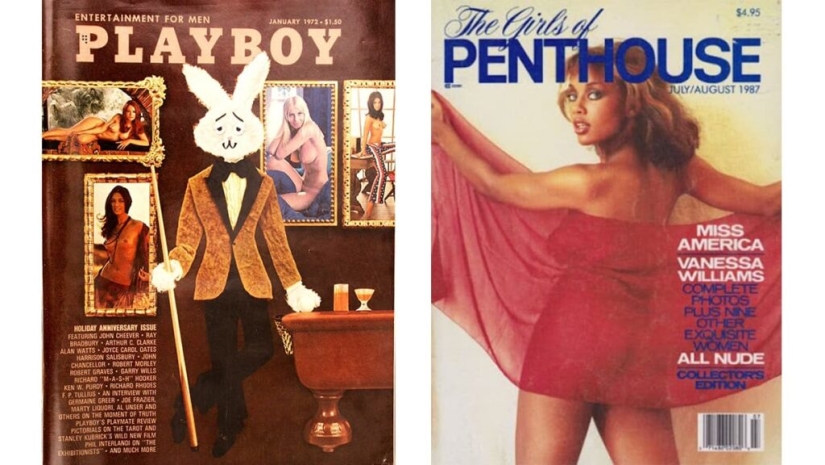
It is worth noting that the number broke all sales records, having dispersed in just 3 days. Many paid $1 just to hold the scandalous issue in their hands. After the release of this issue, Vanessa Williams refused the prestigious title of Miss America, because she could not stand the humiliation and insults in her address.
In 1974, a new gloss appeared on the market – "Hustler". It was invented by the American publisher Larry Flint. Adult magazines at that time could no longer surprise anyone with naked girls on the covers. But this magazine was not going to compete with Playboy and Penthouse.
"Hustler" decided to go with the trumps, and therefore immediately began to publish the genitals of the girls in close-up. One of the most scandalous magazine covers was the publication of the nude First Lady of the United States Jacqueline Kennedy Onassis in November 1975.
The next cover of "Hustler", which made a lot of noise, was released in April 1978. The cover featured the crucifixion of the Easter bunny. Thus, Gloss decided to expose the commercialization of a religious holiday.
And the third edition, which left almost no one aside, was published in June 1978. This time the cover featured a meat grinder grinding a woman into mincemeat. The inscription read: "We will no longer perceive women as meat!". Waves of outrage have passed from avid feminists to vegetarians.
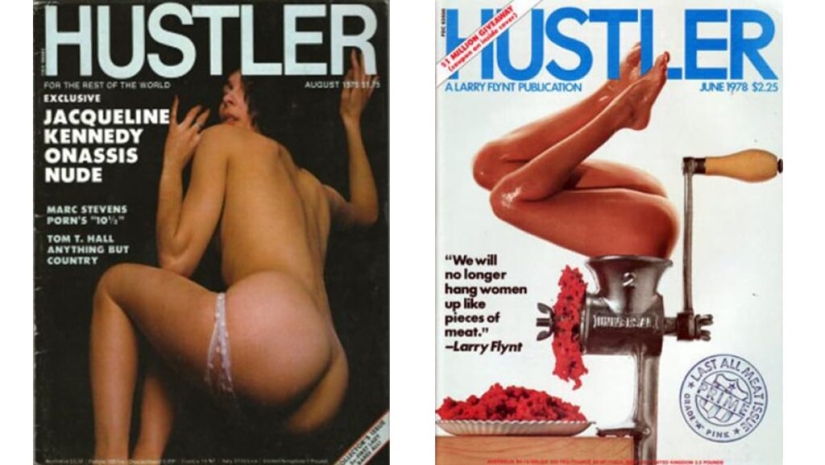
In 1976, pornographic comics about Chester the Seducer (Chester the Molester) appeared on the pages of the scandalous gloss. Soon the author of the comics was put behind bars for the seduction of minors, because often the pictures had pedophilic overtones.
With its provocative publications, "Hustler" seriously angered half of the American population. In 1978, Larry Flint was even assassinated. The famous serial killer and racist Joseph Paul Franklin was deeply offended by the pictures of interracial sex published in a pornographic magazine. After Joseph's attack, Flint was confined to a wheelchair for the rest of his life.
But the scandals did not end there. In 1983, in the November issue of Hustler, a comic interview was published with the participation of the famous American pastor and Christian televangelist Jerry Falwell.
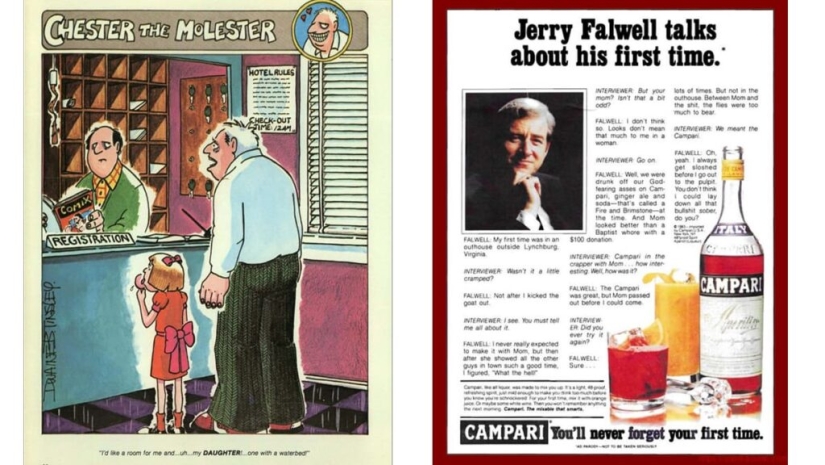
On one of the pages of the pornographic gloss there was an advertisement for the Italian liqueur Campari and a humorous brief interview with various celebrities. They all answered the ambiguous question: "How did it happen the first time?". In fact, the question was not about a person's first sexual experience, but about what happened when he first tasted Campari liqueur.
In a parody interview with Jerry Falwell, it was written that he and his mother got drunk in the yard of their house, and an incestuous sexual act took place between them. After the interviewer explained the meaning of his questions to Jerry, he asked if he would continue to drink Campari. To which Falwell replied, "Of course! I drink all the time before my performances. You don't think I can carry all this shit sober, do you?"
It is worth noting that at the bottom of the page there was a signature: "Parody publication – not to be taken seriously!". For such slander, Falwell sued Hustler and demanded that the magazine pay moral compensation in the amount of $45 million.
The court sentenced the publishing house to pay the preacher a fine of $ 150 thousand. However, Larry Flint appealed, saying that the magazine operates under the First Amendment of the US Constitution, which guarantees freedom of speech. The court, in turn, acquitted the scandalous "Hustler".
Adult magazines are still very popular among the population, and therefore are published to this day. Due to the development of new technologies and the emergence of new moral and ethical standards, publications have undergone many changes. But nevertheless, U-turns with sexy young girls will be relevant as long as humanity itself is alive.
Recent articles

It's high time to admit that this whole hipster idea has gone too far. The concept has become so popular that even restaurants have ...

There is a perception that people only use 10% of their brain potential. But the heroes of our review, apparently, found a way to ...

New Year's is a time to surprise and delight loved ones not only with gifts but also with a unique presentation of the holiday ...